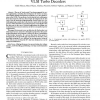Free Online Productivity Tools
i2Speak
i2Symbol
i2OCR
iTex2Img
iWeb2Print
iWeb2Shot
i2Type
iPdf2Split
iPdf2Merge
i2Bopomofo
i2Arabic
i2Style
i2Image
i2PDF
iLatex2Rtf
Sci2ools
TVLSI
2002
2002
Architectural strategies for low-power VLSI turbo decoders
Abstract--The use of "turbo codes" has been proposed for several applications, including the development of wireless systems, where highly reliable transmission is required at very low signal-tonoise ratios (SNR). The problem of extracting the best coding gains from these kind of codes has been deeply investigated in the last years. Also the hardware implementation of turbo codes is a very challenging topic, mainly due to the iterative nature of the decoding process, which demands an operating frequency much higher than the data rate; in the case of wireless applications, the design constraints became even more strict due to the low-cost and low-power requirements. This paper first presents a new architecture for the decoder core with improved area and power dissipation properties; then partitioning techniques are proposed to reduce the power consumption of the decoder memories. It is proven that most of the power is dissipated by the large RAM units required by the decoder, ...
| Added | 23 Dec 2010 |
| Updated | 23 Dec 2010 |
| Type | Journal |
| Year | 2002 |
| Where | TVLSI |
| Authors | Guido Masera, M. Mazza, Gianluca Piccinini, F. Viglione, Maurizio Zamboni |
Comments (0)

